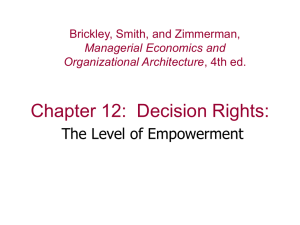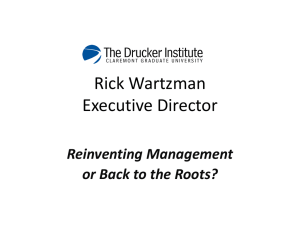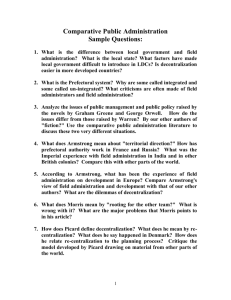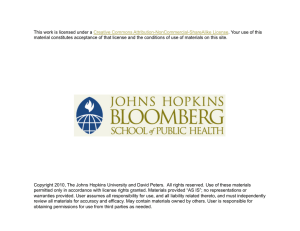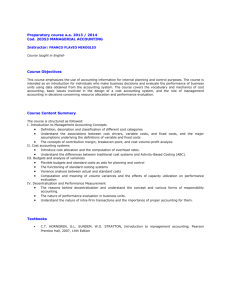Decentralization of Authority
advertisement
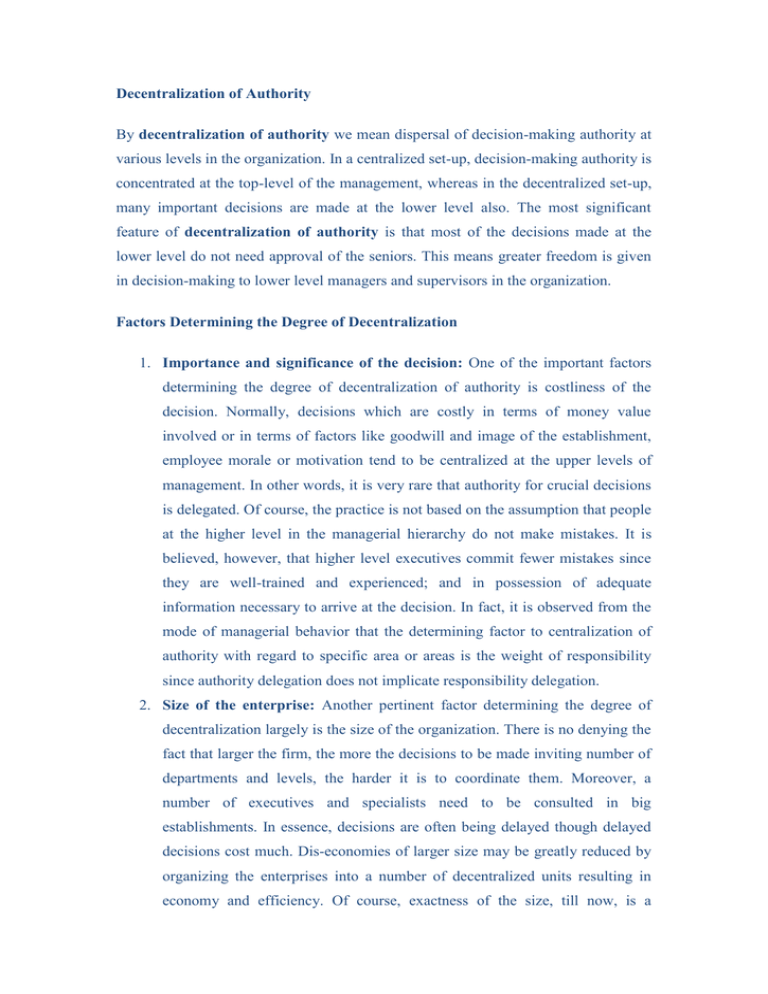
Decentralization of Authority By decentralization of authority we mean dispersal of decision-making authority at various levels in the organization. In a centralized set-up, decision-making authority is concentrated at the top-level of the management, whereas in the decentralized set-up, many important decisions are made at the lower level also. The most significant feature of decentralization of authority is that most of the decisions made at the lower level do not need approval of the seniors. This means greater freedom is given in decision-making to lower level managers and supervisors in the organization. Factors Determining the Degree of Decentralization 1. Importance and significance of the decision: One of the important factors determining the degree of decentralization of authority is costliness of the decision. Normally, decisions which are costly in terms of money value involved or in terms of factors like goodwill and image of the establishment, employee morale or motivation tend to be centralized at the upper levels of management. In other words, it is very rare that authority for crucial decisions is delegated. Of course, the practice is not based on the assumption that people at the higher level in the managerial hierarchy do not make mistakes. It is believed, however, that higher level executives commit fewer mistakes since they are well-trained and experienced; and in possession of adequate information necessary to arrive at the decision. In fact, it is observed from the mode of managerial behavior that the determining factor to centralization of authority with regard to specific area or areas is the weight of responsibility since authority delegation does not implicate responsibility delegation. 2. Size of the enterprise: Another pertinent factor determining the degree of decentralization largely is the size of the organization. There is no denying the fact that larger the firm, the more the decisions to be made inviting number of departments and levels, the harder it is to coordinate them. Moreover, a number of executives and specialists need to be consulted in big establishments. In essence, decisions are often being delayed though delayed decisions cost much. Dis-economies of larger size may be greatly reduced by organizing the enterprises into a number of decentralized units resulting in economy and efficiency. Of course, exactness of the size, till now, is a controversial matter, nothing in particular or the categorically can be prescribed. But it is to be appreciated in all circumstance that the size of each individual unit should be so determined that departments or units are easily manageable with authority considerably decentralized. 3. Management attitude and philosophy: Decentralization is largely a question of character of top executives and their attitude. It may be noted that outlook and attitude of top management is, undoubtedly, a significant determinant of the extent and mode of authority dispersal. It is certain that an executive with traditional rigid outlook hardly contemplates delegating substantial authority. On the other hand, people with rational managerial temperament believe and want to rely upon participative approach of doing the work and are anxious to take maximum opportunity of individual initiative in the organization, opt for decentralization. 4. Control techniques: Another related factor determining the degree of decentralization is the magnitude of desire to obtain uniform policy with regard to such vital factors as price of a product, service, delivery, credit, etc., which can best be practiced by centralized authority. And there is no denying the fact that such a standing belief deters them from delegating authority to others-even to executives of regional offices. Of course, the internal advantage of uniform policy cannot be undermined altogether. But, in the same event, costs involved to centralize decisions must also be taken into account. It is further to be appreciated that centralization is likely to arrest individual initiative, dampening future growth of managerial personnel from within the organization. 5. Availability of capable executive: Nevertheless, availability of capable executive substantially determines the nature and extent of dispersal of authority. It is not uncommon that top executives willing to delegate authority and themselves handicapped in that respect for want of capable and qualified subordinates. Obviously, the key to safe decentralization is adequate training of subordinates and make them able to shoulder higher responsibility effectively. And perhaps it would be interesting to note that decentralization provides possible opportunities to impart the training required. 6. Environment Influences: So far the determinants of the extent of decentralization that have been analyzed belong to the interior of the firm. But certain external forces are also significant in determining the mode of decentralizing authority. There should not be any controversy over the fact that forces like government controls, national unions, fiscal policy of the government, government purchases, etc., to a considerable length determine and mold the extent and nature of decentralization of an organization. In fact, these forces on many occasions deter the management of an enterprise to delegate authority down the echelon since many aspects of the functioning are virtually controlled by such echelon since many aspects of the functioning are virtually controlled by such external forces. Say for example, when raw material is subject to government allocation, the extent of authority that can be given to purchasing and factory managers is really a point of argument. Likewise, if pricing of any product is subject to regulation, hardly any authority could be given to sales manager to exercise and assert. Credit: Principles of Management-MGU MBA- Knowledge Base
